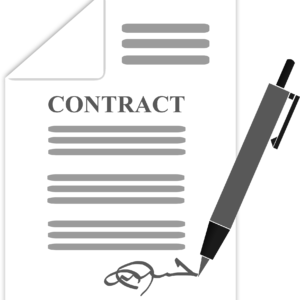No matter if you are selling a recently opened online store or if your e-store can be counted among the thriving ones with high traffic and a long history. There are several issues that every owner should verify before putting their store up for sale, especially if they expect to conduct legal due diligence on the transaction. What should you pay special attention to when selling your e-store?
1.Domain
In contracts for the sale of an e-store, we often come across a provision that the seller will transfer ownership of the domain to the buyer. This is an error. It is not possible to transfer such ownership. It is only possible to transfer the right to the domain.
Thus, the first step should be to review the content of the terms and conditions of the domain registrar under which our e-store is registered. This is because it is necessary to verify how to assign the rights to the domain to the buyer of our online store. For example, the assignment may involve making additional statements and filling out appropriate forms, which still have to be reviewed and approved by the registrar.
So let’s not agree in the contract that the domain ownership will pass to the buyer upon payment of the consideration or conclusion of the contract. Usually, this is simply unrealistic.
You should also remember to verify the basic issue – whether the entity that will sell the e-store is authorised to manage the relevant domain as the domain is often registered in the name of an individual, while the operational activity of the store is carried out through a company owned by that individual.
2.Contract with the developer
Another frequent situation is where, just before the sale of the store, it turns out that we need to quickly sign a contract with its developer. This necessity results from the fact that the order for its creation, guidelines for specifications, supervision over implementation, etc. – all this is done by e-mail. Under Polish law, in turn, in order for the transfer of the author’s proprietary rights to be effective, the contract must be in writing – otherwise, it is void. You should be aware that you will not satisfy that condition either by exchanging photocopies of a signed contract.
We have also handled cases where the contract with the developer had to be annexed because it did not include permission to exercise derivative rights. On the other hand, rarely will a buyer be willing to purchase a website that cannot be modified later, unless by the original developer.
3.Trade marks
Not only before selling, but even before naming our store, it is worth verifying that no identical or similar trademark has been applied for. If there is an entity with a similar or identical trademark, you may be required to change the name of the business or rebrand it, not to mention blocking the fanpage and adwords. It’s easy to imagine that the buyer of our online store won’t be happy, having concluded the contract with us, to make an extra effort and money to change the name.
4.Copyrights and an e-store
Not only logos and layouts used on a website may be subject to proprietary copyrights. Copyright may cover almost anything, from typography, through emoticons, to icons. Therefore, you should make sure whether the contract with the website developer provides for the transfer of proprietary copyrights to everything given to you with the completion of the work, or maybe the contract is only for modifications to the skin or stock elements were used for which only a non-exclusive license is granted.
The issue of holding proprietary copyrights is very important. If you don’t have them, as a consequence, of course, you cannot transfer any frights to the buyer. And the buyer, in turn, will certainly protect itself against such cases, introducing into the contract your liability for legal defects in the subject matter of the contract.
So examine your contracts with the contractors who created your e-store and review what rights you hold and what not. If you are in a situation where you can still amend the contract with contractors – do it.
5.Open licences
It is very common for online stores to use solutions and functionalities covered by open licenses. Therefore, it is worth verifying whether this was the case with your store. This is important so that the future buyer can use these solutions on the same terms as the seller. However, if you do not indicate in the contract that there are such functionalities within the store and declare that the transfer of proprietary copyrights applies to all elements of the website, then the buyer can point out that your statement was false and claim compensation for the resulting damage.
6.Other licences
Some solutions provided by third parties may, in turn, be licensed directly to the seller under a separate agreement. This may apply in particular to CMSs. In such a case, it is necessary to verify whether it is possible to assign the rights under it to the buyer of our store.
It can be tedious to verify basic issues related to intellectual property rights applying to our store. However, only by checking the elements described above you will be able to draw up and conclude a properly structured contract, which will eliminate the risk of any claims against you.
So, in the context of the above sections 4., 5. and 6., it’s a good idea to draw up an IP list to be attached to the store sales contract, which will indicate what rights you are transferring, what you have an open license for, and to what extent the buyer has to procure a license with you.
7.Contact database
You should also remember that if you sell your online store, the personal data controller will change. In such a case, it will be necessary to comply with the obligation to provide information, by sending such persons an appropriate message with all the information required by the GDPR. So if you have “random” contacts in the database, it is a good idea to remove them from the database first, before they receive such a message and exercise their rights under the GDPR in case of non-compliant processing of personal data.
Are you putting your e-store up for sale and are interested in aspects we haven’t covered above? Contact us!




